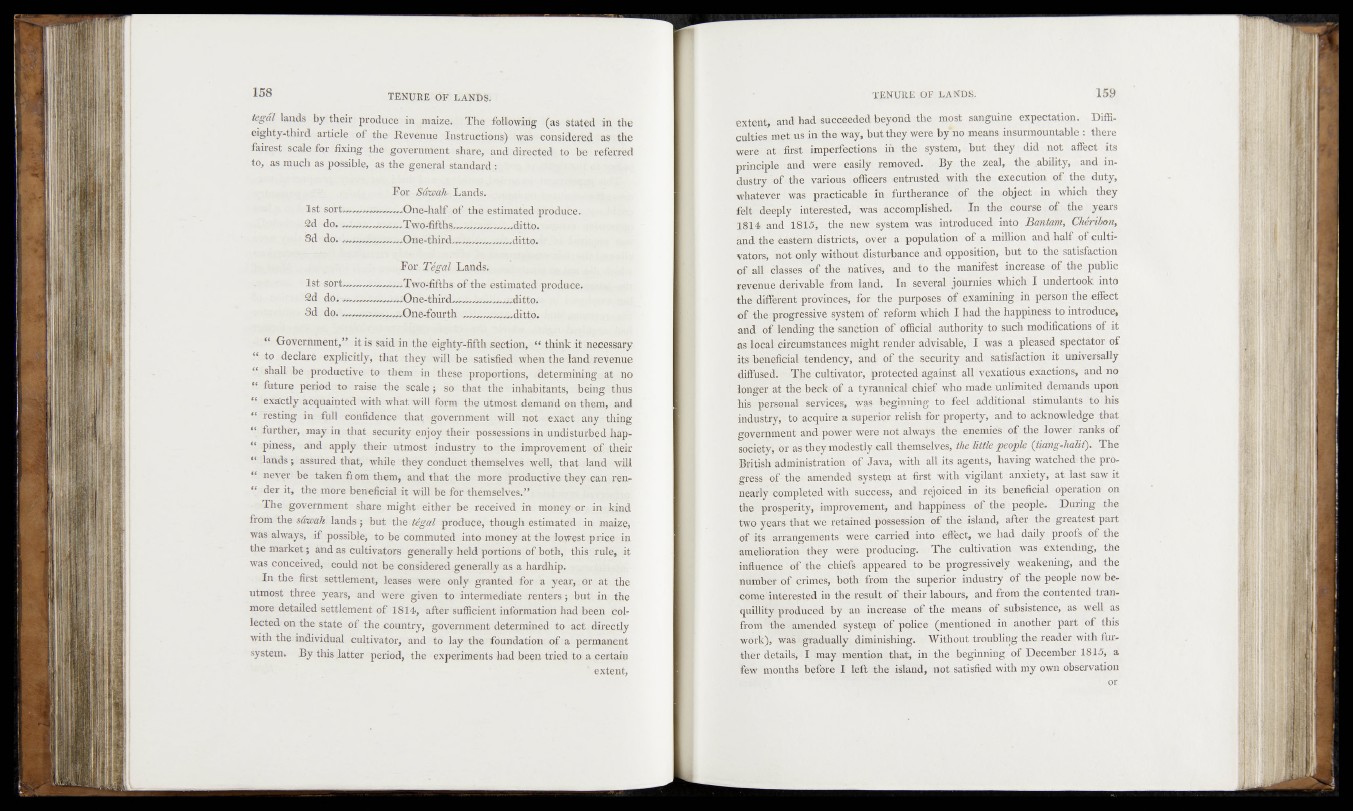
legal lands by their produce in maize. The following (as stated in the
eighty-third article of the Revenue Instruetions) was considered as’> the
fairest scaleTqr fixing the government share, and directed* to he referred
to, as nujch ,as posable,' as the general standard:
Ton jS'aïaaA- Tainds.
^.One-half .of the estimated produce.
^Two-fifths^^™^5^™,ditto.
«,OHe-third^i^>w^,_ditto.
Bor Têgal Lands.
1st sort~»^~^/^w~Two-fifths of the estimated '.produce. .■>
■ - . ild: - ..
> 3d do. ~~~~i~w>~^One-fourth i^ ^w v ^d itto . . *
(Hm Government,” it is said in the eighty-fifth section,..“jthink itinecessary
Slrto declare explicitly, that theyi will he satisfied when the land; revenue
i^shah be productive, tcrthem in these proportions, rdèterminnag, at no
ffrfotBfe period, t© raise the scale j so that the • inhabit$nt^sbeihg^th(US
“ exactly acquainted with what will form the utmost demand on them, and
“ resting in foil confidence that government will .not 'rexact |. any c thing
“ fo rite r,, may. in that security: enjoy their possessions .in undistusbed.hap-
“ piness, and apply their utmost industry -tojtbe .improyemeht jofi^heir
“ lands ; assumed that, while theyconduct themselves :wëll,< that' jland jwS
ft:'ttefpr!die "taikenffiom them, and that -the more productive-they'can ren-
‘f ;d@r it, the more beneficial it will be for themselves.” ; a
-Th e government share might Cither'be received in. money Kirvin, kind
® |É | séwah.lwa^s-, but the-legal produce, though estimated an maize,
was always, a f possible; to be commuted into money at .the lowest ;priee in
the market; and as cultivators generally-held portions of.both, this' ruleji it
was conceived, could not be considered generally as a hardhip.
In the first settlement, leases were only- granted for a year.,; or at the
utmost three; yeai%> .apd :we**è giv&n to intermediate centers.-; tiutirin,- the
more detailed settlement of 1814, after sufficient, information had been collected
on the state of The country, government determined to act directly
with the individual cultivator, and to -lay -the foundation of a permanent
system. By this jatter period, the experiments had been tried to. a ,certain
* extent,
1st sort,.
2d do. ^
3d do. fc
extent, and had succeeded beyond the most sanguine expectation. Difficulties
met us in the way, hut they were by*to means insurmountable a there
were., htri first-imperfections, in'the system, hut .they did not affect its
principle and were, easily removed. '.By the zeal, the .ability, and industry
fof'the'.yariouEs . officers, .entrusted .with the execution of the duty,
whatever was practicable in. furtherance, d of the .object'in which they
fehjrtdeeply .• interested, was accomplished. In the course of the years
1814 and 1815,. dhesnew system was. i introduced info Bantam, Gherihon,
and the eastern.districts, over a population of a million and half of cultivators,
nob only without disturbance, and opposition, but fo the satisfaction
of all classes of the natives, .and to .the manifest increase . of the public
revenue}derivable• from land. Jin several .journies which I undertook into
the-different provinces, for the. purposes qf-examining in person5 the jefiect
of the progressive system of reform which I had the happiness to introduce
and of< lending the sanction of official authority to such modifications of it
as local- circumstances might .render advisable, I was a pleased spectator of
its beneficial. tendency, and of the security and satisfaction it universally
diffused. - The cultivator, protected against all; vexatious exactions, and no
longer at the beck, of a tyrannical'chief who made unlimited demands upon
his ..personal! services, was beginning ftpvffeel additional stimulants to his
industry;1 to Enquire a. superior relish for property, and to acknowledge .that
government and power were not always the enemies of the lower: ranks of
society, or as: they modestly .call .themselves, the Mate people (tiangrkalit). The
British administration, of Java, with all its.ageats, having watched)the progress
-of-the amended systejffi at first with vigilant anxiety,riafe last saw it
nearly-completed with success, and rejoiced in its -beneficial operation on
th e ‘prosperity, improvement, and" happiness ©f the people. During. .the
two years that we retained possession of the island, after the greatest part
of its arrangements were carried .intoreflect, we .had daily proof? ,of the
amelioration ■ they were producing. .The cultivation was extending, the
influence-of the chiefs appeared to. he, progressively. weakening, and 'the
number of crimes, both from the superior industry of the .people now! become
'interested in the result of their -labours, and from the contented tran-
quillity produced by an increase of the means of subsistence, as well as
frow the- amended system of police (mentioned in another p a rt,of this
work), was gradually, diminishing.. Without troubling the reader with for-
ther details, I may mention that, in the . beginning-'of December 1815, a
few months before I left the island, not- satisfied with my o.wn observation